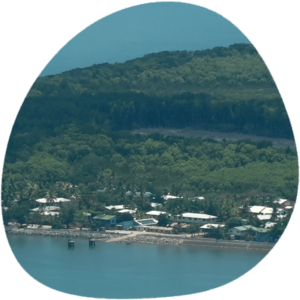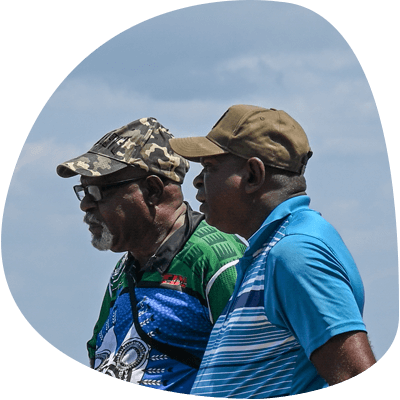The case
The Australian Climate Case
Uncle Pabai and Uncle Paul are First Nations leaders from remote islands in Guda Maluyligal in the Torres Strait. They are taking the Australian Government to court for failing to prevent climate change.
Uncle Pabai and Uncle Paul are Traditional Owners whose ancestors have lived in the Torres Strait for thousands of years. Now they are on the frontline of climate change, and face losing their island homes under rising seas.

Australia’s response to climate change is one of the weakest in the world. If the Federal government doesn’t change course – and fast – then islands in the Torres Strait could become uninhabitable. This would force Torres Strait Islander communities to leave their homes, severing thousands of years of connection to the land and making them Australia’s first climate change refugees.
This case is the first time that anyone in Australia has argued that the whole of the Federal government – not just one Minister or agency – has a duty to protect people from climate harm. If successful, Uncle Pabai and Uncle Paul won’t just be protecting their communities – they’ll be making us all safer from damaging climate change.
The legal arguments
Uncle Pabai and Uncle Paul have turned to the courts in the hope of protecting their communities from disaster. They are arguing that the Federal government has a legal responsibility to ensure Torres Strait Islander Peoples are not harmed by climate change. In legal terms, this is called a ‘duty of care’.
Uncle Pabai and Uncle Paul will argue that by failing to prevent climate change the Australian government has unlawfully breached this duty of care, because of the severe and lasting harm that climate change would cause to their communities. They are seeking an order from the court requiring the government to prevent this harm to their communities by cutting greenhouse gas emissions.
Read a simplified summary of Uncle Pabai and Uncle Paul’s case
Other court documents are also available from the Court’s website, including the Statement of Claim and the government’s defence.
Torres Strait Islanders have a long history of fighting for their rights – and some of those battles have transformed the face of modern Australia. Torres Strait Islander man Eddie Mabo took on the government through the courts and established that terra nullius was a lie, paving the way for land rights for all First Nations Peoples in Australia.
Building on international success
The Australian Climate Case has been developed in partnership with the Urgenda Foundation, international legal experts who have a proven record of successful climate change litigation.
It all started in 2015, when the Urgenda Foundation helped 886 people in the Netherlands take the Dutch government to court for not doing enough to prevent climate change. They won the case in the District Court of the Hague and then won again at the two stages of appeal, with a final victory in the Supreme Court in 2019.
The case was the first to establish that a government has a duty of care to protect people from climate harms. The court ordered the Dutch government to significantly reduce the Netherlands’ greenhouse gas emissions within 5 years.
As a result of the groundbreaking case, the Netherlands now has some of the strongest climate policies in the world. It is closing coal-fired power stations and investing billions in renewable energy and energy efficiency. People in Belgium, Colombia, France, Germany and Ireland have also had success in the courts, and there are similar cases under way in other countries.

This isn’t just about the Torres Strait. People all across Australia are going to be hit hard by climate change: sea level rise, bushfires, floods, droughts and other dangerous climate impacts will affect us.
So if we win, it won’t just protect our communities – we’ll be keeping everyone safe.
– Uncle Pabai + Uncle Paul
